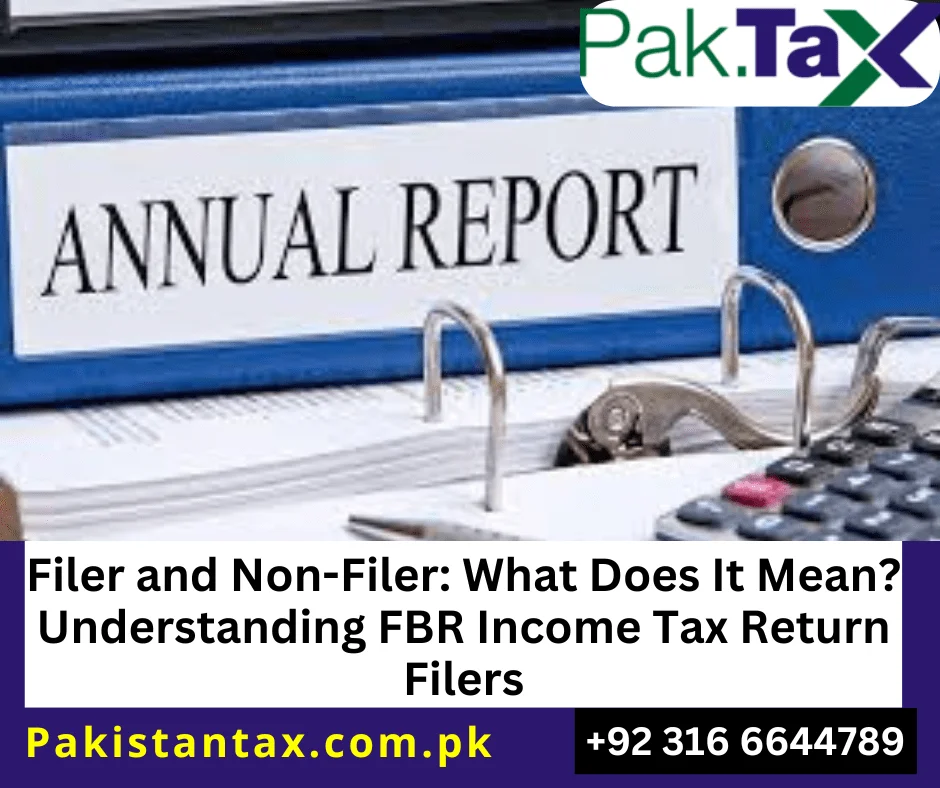Filer and Non-Filer | What Does It Mean? Understanding FBR Income Tax Return Filers
Navigating the Differences Between 'Filer' and 'Non-Filer' in Pakistan
The terms ‘filer’ and ‘non-filer’ are pivotal in the realm of income tax in Pakistan, denoting critical distinctions in an individual’s or business’s fiscal responsibilities. A ‘filer’ refers to an entity or individual who has duly submitted their income tax returns within the stipulated period, thereby ensuring compliance with national tax regulations. Conversely, a ‘non-filer’ is someone who has not fulfilled this obligation, resulting in a non-compliance status that can have significant repercussions.
The Financial and Legal Benefits of ‘Filer’ Status in Pakistan
Filing income tax returns is more than just a statutory requirement; it is fundamental to maintaining transparency and accountability in a nation’s financial system. For individuals and businesses alike, filing returns with the Federal Board of Revenue (FBR) secures a plethora of advantages. Filers enjoy lower tax rates, eligibility for tax rebates, and the ability to carry forward losses to offset future taxable income. Additionally, being a filer enhances one’s creditworthiness and eligibility for loans and various economic incentives.
FBR Initiatives for Tax Collection: Impact on ‘Filers’ vs. ‘Non-Filers’
The FBR, or the Federal Board of Revenue, plays a crucial role in managing and overseeing tax collection in Pakistan. This governmental body is tasked with the administration of tax laws, the collection of taxes, and ensuring taxpayer compliance. The FBR’s initiatives are aimed at broadening the tax base, reducing evasion and avoidance, and fostering a culture of voluntary tax compliance among the populace.
How Tax Return Filing Lawyers in Karachi Assist ‘Filers’ and ‘Non-Filers’
For both individuals and corporate entities, the distinction between being a filer and a non-filer is not just legal but also financially strategic. It is imperative to consult with tax return filing lawyers in Karachi for expert advice and seamless compliance. Such professional guidance ensures that taxpayers fulfill their obligations accurately and on time, thereby avoiding penalties and fostering a transparent fiscal environment. Understanding these terms and the role of the FBR is essential for every taxpayer, ensuring both legal conformance and optimized fiscal health.

Steps to Achieve ‘Filer’ Status with the Federal Board of Revenue
A filer is an individual or entity that is recognized by the Federal Board of Revenue (FBR) as compliant with the legal obligations to submit income tax returns. To qualify as a filer, an individual or business must follow the prescribed process of preparing and submitting detailed accounts of their income, deductions, and tax liabilities within the stipulated deadlines.
Essential Documents for 'Filer' Tax Return Preparation
The process of filing begins with the collection of relevant financial records, such as pay slips, bank statements, and receipts for deductible expenses. Taxpayers must log into the FBR’s online portal and fill out the appropriate tax return forms, which are tailored to different types of income and business activities. The FBR provides specific forms for salaried individuals, professionals, companies, and other entities. Accurate reporting on these forms is crucial to ensure compliance and avoid potential legal issues.
Corporate Entities and Quarterly Tax Payments for ‘Filers’
A diverse range of individuals and businesses are required to file income tax returns. This includes salaried persons whose annual income surpasses the exemption threshold set by the FBR, self-employed professionals like doctors and lawyers, business owners, and companies of all sizes. Additionally, individuals holding foreign assets, or those who earned foreign income, must also file returns. For corporate entities, quarterly advance tax payments might also be part of the filing obligations.
Avoiding Penalties: How Timeliness Affects ‘Filer’ Status
Timeliness is a critical aspect of the filing process. The FBR sets specific deadlines for the submission of income tax returns, and adherence to these deadlines is necessary to maintain filer status. Filing within the prescribed timeframe offers multiple benefits, including eligibility for lower withholding tax rates and avoidance of penalties and fines. Moreover, being a filer enhances an individual’s or a business’s credibility and can facilitate smoother financial transactions.
Tax Benefits for ‘Filers’: Enjoying Lower Rates and Savings
Being a filer in Pakistan, particularly with the Federal Board of Revenue (FBR), carries a multitude of advantages that significantly benefit an individual or business entity. One of the primary perks is the considerably lower tax rates. Filers enjoy reduced tax liability on various transactions including property purchases, vehicle registration, and banking transactions. This stands in stark contrast to the higher rates non-filers are subjected to, making the financial savings appreciable.
Legal and Financial Repercussions for Non-Filers vs. 'Filers'
Another notable benefit is the avoidance of penalties. Non-filers face strict penalties from the FBR, which can include fines and, in extreme cases, legal action. By ensuring compliance with FBR income tax return filing, individuals can sidestep these punitive measures, thus safeguarding themselves from financial and legal repercussions.
The Financial Benefits of Being a ‘Filer’: Access to Tax Refunds
Tax filers also become eligible for tax refunds, a significant financial advantage. When a filer overpays their taxes, they can claim the excess amount back from the FBR. This feature ensures that individuals do not lose money to the tax system unnecessarily and can retain greater control over their finances.
‘Filer’ Status Improves Loan Approval and Credit Opportunities
Moreover, being a filer greatly enhances one’s creditworthiness. Financial institutions often scrutinize credit history and tax compliance as part of their evaluation process. Filers demonstrate financial discipline and responsibility, which translates into higher chances of loan approvals, better interest rates, and enhanced credit facilities. Furthermore, this compliance is often a prerequisite for participation in various government tenders, providing expanded business opportunities.


Expert Assistance: Why Hire Tax Return Filing Lawyers in Karachi
For those seeking assistance, engaging the services of return filing lawyers in Karachi can streamline the process, ensuring accuracy and compliance. These tax return filing lawyers in Karachi are well-equipped to navigate the complexities of tax laws, offering expert advice and facilitating a seamless filing experience.
Why FBR Income Tax Return Filing is Crucial for Financial Success
In essence, the commitment to FBR income tax return filing not only fulfills a legal obligation but also opens doors to numerous financial and operational benefits. Whether it’s through reduced tax rates, penalties avoidance, eligibility for refunds, or improved creditworthiness, the advantages of being a filer are substantial and far-reaching.
Why ‘Non-Filer’ Status Leads to Increased Tax Burdens with the FBR
Being categorized as a non-filer by the Federal Board of Revenue (FBR) carries a range of significant drawbacks. One of the most immediate consequences is the imposition of higher withholding tax rates. For instance, non-filers are subjected to elevated rates on various types of income and transactions, such as salary payments, bank withdrawals, and property transactions. This punitive measure is designed to incentivize compliance with income tax return filing obligations.
Consequences of Tax Non-Compliance: Fines and Surcharges for 'Non-Filers'
Another critical repercussion is the heightened risk of legal penalties. Non-compliance with tax laws can result in severe penalties that may include substantial fines and surcharges. Moreover, the FBR possesses the authority to levy additional taxes retroactively, imposing financial strain on non-compliant individuals and businesses. This further underscores the importance of timely and accurate fbr income tax return filing.
Challenges in Acquiring Loans and Credit for ‘Non-Filers’
Beyond financial repercussions, non-filers face limited financial opportunities. Financial institutions, including banks, may restrict access to certain services and facilities for non-filers. For example, acquiring loans or credit cards can become challenging, as these institutions often require proof of tax compliance as part of their due diligence process. This limitation extends to investments, where the lack of an up-to-date tax record can act as a barrier to entry into lucrative financial markets.
Contact Us


Consequences of Tax Evasion: ‘Non-Filers’ and FBR Audits
Moreover, non-compliance with tax laws opens the door to audits and legal action. The FBR actively monitors and audits individuals and businesses suspected of evading taxes. Being targeted by such audits can be resource-intensive, leading to disruptions in business operations and personal financial planning. Legal actions, if initiated, can culminate in protracted court battles that further drain resources and tarnish reputations.
Navigating Tax Regulations with Karachi’s Expert Lawyers
The involvement of return filing lawyers in Karachi is often sought to navigate the complexities of tax regulations. These experts provide crucial assistance in ensuring compliance and protecting clients from potential legal and financial pitfalls. Employing tax return filing lawyers in Karachi is not merely a protective measure; it is a proactive step toward maintaining financial health and legal compliance.
Enforcement Strategies of the Federal Board of Revenue (FBR)
The Federal Board of Revenue (FBR) is the paramount agency overseeing tax collection and enforcement in Pakistan. It is tasked with a multitude of responsibilities that are critical to the economic health of the country. The FBR plays a crucial role in the administration and enforcement of fiscal laws, ensuring that tax compliance is achieved across various sectors of the economy. This is accomplished through a stringent enforcement framework designed to detect, deter, and penalize tax evasion and non-compliance.
Income Tax and Sales Tax Collection by the Federal Board of Revenue (FBR)
One of the primary duties of the FBR is the collection of income tax, sales tax, customs duties, and other statutory levies. The agency is instrumental in managing and streamlining the process of income tax return filing, making it accessible to both individual taxpayers and businesses. It utilizes advanced systems to manage taxpayer information, which assists in the accurate and efficient collection of tax revenues.
The Role of the Federal Board of Revenue (FBR) in Collaborating with Tax Return Lawyers
Further, the FBR is committed to fostering tax awareness and promoting a culture of voluntary compliance among the citizens and businesses of Pakistan. Through various outreach and educational programs, seminars, and digital campaigns, it aims to demystify the tax return filing process and highlight the benefits of being compliant. The FBR also works closely with return filing lawyers in Karachi and other major cities to aid taxpayers in navigating the legal complexities associated with tax obligations.
Regulatory Framework Developed by the Federal Board of Revenue (FBR)
In addition to these roles, the FBR develops and enforces regulations to ensure the consistent application of tax laws. It collaborates with international bodies and tax authorities to align Pakistan’s tax system with global standards, thereby enhancing transparency and accountability. The FBR also contributes to the formulation of fiscal policies by providing data and insights that influence economic strategies.
Innovative Approaches by the Federal Board of Revenue (FBR) to Encourage Taxpayer Compliance
Overall, the FBR’s efforts are geared towards creating a robust tax system that not only supports the country’s financial stability but also encourages taxpayer compliance through effective administration and innovative approaches to tax education.
Step-by-Step Guide to Becoming a Filer in Pakistan with the Federal Board of Revenue (FBR)
Becoming a filer in Pakistan involves a straightforward yet crucial process that plays a significant role in regularizing your financial affairs and contributing to national development. Here is a step-by-step guide on how you can become a tax filer with the Federal Board of Revenue (FBR):


Gathering Key Documents: A Guide for Aspiring Filers in Pakistan
First, gather the necessary documentation. You will need your Computerized National Identity Card (CNIC), bank account details, proof of income, and any other relevant financial documents. Proper documentation is essential to ensure the accuracy of your tax return filing.
Completing Your FBR Registration: From Application to NTN Issuance
Next, you need to register with the FBR. Visit the official FBR website and select the “Registration for Unregistered Person” option. Fill out the required information, including personal and contact details, and submit the application. Upon successful registration, you will receive a confirmation email with your National Tax Number (NTN) or Registration Number.
Navigating the Income Tax Return Filing Process with Your NTN in Pakistan
Once you have your NTN, you can proceed to file your income tax return. Log in to the FBR online portal using your credentials. Choose the appropriate tax year and fill out the Income Tax Return form, providing accurate details of your income, expenses, and tax deductions. Ensure that all the information is accurate and honest to avoid legal complications. After completing the form, submit it online.
First-Time Filers Should Consult Return Filing Lawyers in Karachi
For first-time filers, it is advisable to consult with return filing lawyers in Karachi or qualified tax professionals who can guide you through the process. They can help you understand complex tax codes and ensure that your filing is error-free. Engaging experienced tax return filing lawyers in Karachi can also safeguard you against potential pitfalls and financial penalties.
Maintaining Good Standing with FBR Through Honest Tax Reporting
The importance of accurate and honest reporting cannot be overstated. Accurate reporting ensures compliance with tax laws and regulations, mitigating the risk of audits and penalties. Furthermore, filing returns on time aids in maintaining a good standing with the FBR, facilitating smoother financial transactions and future tax affairs.
The Essentials of Becoming a Filer for Financial Accountability
In essence, becoming a filer is not only a legal obligation but also a crucial step towards financial accountability and transparency. By following these steps diligently, you can navigate the process smoothly and contribute to the nation’s fiscal health.
Top Mistakes to Avoid When Submitting Your Tax Return
Filing an income tax return with the Federal Board of Revenue (FBR) can be a daunting task for both individuals and businesses. Numerous common challenges and mistakes can complicate the process, potentially leading to penalties or audit triggers. One recurrent issue is the submission of incorrect information. Errors in personal details, income figures, or deductions can not only delay the processing of your return but may also attract fines. Ensuring accuracy involves double-checking all relevant documents and figures before submission.
24/7 Customer Support
If you want to know anything about our services, you can contact us through Phone, WhatsApp.
Karachi Office
Islamabad Office

Effective Methods for Staying on Track with Tax Deadlines
Another frequent problem is missing the tax filing deadline. The FBR establishes specific dates by which returns must be filed, and missing these deadlines can result in late fees and interest charges on any overdue taxes. Utilizing reminders and setting calendar alerts can assist in staying on top of these critical dates.
Common Missteps in Tax Filing and How to Avoid Them
Misunderstanding tax laws and their application is another common pitfall. Tax regulations can be complex, and failing to grasp the nuances can lead to incorrect filings. For instance, there are often misunderstandings regarding applicable tax credits, allowances, and exemptions. Consulting with return filing lawyers in Karachi, who have specialized knowledge, can be invaluable in navigating these complexities and ensuring compliance with tax laws.
Addressing Financial Record Issues in Small Business Tax Filings
Small businesses, in particular, often struggle with maintaining accurate and detailed financial records throughout the year, which can complicate year-end tax filings. Adopting a systematic approach to record-keeping and utilizing accounting software can mitigate this issue. Additionally, seeking advice from tax return filing lawyers in Karachi can help in establishing efficient record-keeping practices and ensuring all relevant expenses and revenues are accurately captured.
Timely Submission Tips for Smooth FBR Income Tax Return Filin
Ultimately, the crux of successful FBR income tax return filing lies in thorough preparation and professional guidance. Avoiding these common mistakes through diligent documentation, timely submission, and expert assistance will facilitate a smoother filing process and help in achieving compliance with the tax regulations.


FBR Income Tax Filing: The Importance of Compliance for Filers vs. Non-Filers and the Role of Tax Return Lawyers in Karachi
Understanding the distinction between filers and non-filers in the context of FBR income tax return filing is crucial for both individuals and businesses. Tax filers, who diligently fulfill their fiscal responsibilities, reap numerous benefits, including eligibility for various financial incentives, reduced withholding tax rates, and avoidance of penalties. Conversely, non-filers are subjected to higher tax rates and limited access to financial privileges, highlighting the importance of compliance. The role of tax return filing lawyers in Karachi is indispensable for those needing guidance through the complexities of the filing process, ensuring that taxpayers meet all legal requirements efficiently and accurately.
FBR Tax Regulations: The Role of Tax Return Filing Lawyers in Adapting to Evolving Compliance Measures
As the landscape of tax regulations continues to evolve, it is anticipated that the Federal Board of Revenue (FBR) will enforce stricter measures to enhance compliance. Potential future changes may include the introduction of digital platforms for easier filing, increased penalties for non-compliance, and more robust data analytics to identify non-filers. Such advancements are aimed at streamlining the tax system, making it more transparent and user-friendly, thereby encouraging a higher rate of voluntary compliance. Tax return filing lawyers in Karachi are likely to play an even more significant role as these changes unfold, offering indispensable expertise to navigate new policies.
Understanding Tax Obligations: Bridging the Gap Between Filers and Non-Filers
To remain in good standing with the FBR, taxpayers must stay informed about the latest updates in tax laws and regulations. Continuous education on the benefits and obligations of being a filer will foster a culture of compliance, contributing to the overall economic stability of the nation. As we move forward, the collaboration between taxpayers, legal advisors, and the FBR will be pivotal in creating a more efficient and equitable tax system. Embracing technological advancements and maintaining proactive communication are key strategies for ensuring that both filers and non-filers understand and fulfill their tax obligations effectively.
